Text
Something cool about Blue Eye Samurai is how sex is juxtaposed with the end-goals.
I really love how our three protagonists are all obsessed. And that obsession defines them, torments them, and are subsequently reborn through their obsessions.
Mizu, of course, is obsessed with the concept of revenge. It's not even about getting even or getting justice as some might use to justify the bloody road taken—it is simply about seeking satisfaction for Mizu. She cuts a bloody swathe across Japan because of what the Four White Devils did to her mother and herself. She does not concern herself with the ramifications of her wrath but merely charges forward, leaving behind a trail of viscera and gore behind her.
Like I said before, her vengeance and obsession with satisfaction is not painted by the show as wrong. It is how she allows it to affect others along the path. It's why the episode with Madame Kaji is so enlightening; Mizu should not tackle this quest as a vengeful revenant; an onryō. She has let the world define her as a monstrosity and so she embraced it, when Swordfather and Madame Kaji knew what the correct path was to satiate her need for vengeance. Treat her sword as the Artisan's tool it truly is. Treat her body the way an Artist would treat their canvas.
Madame Kaji and Swordfather are both outcasts, for being a woman and a blind man. Yet they found strength in their exclusion, becoming single-minded in their fields of art. Because sex is art and swordsmithing is art. It's what makes Mizu's body writing scene so fucking good.
Artistic vision becomes stagnant when one pulls from only one source. They become rigid and unbending when Mizu, like her namesake, must be fluid. She has shown fluidity in her use of her gender and her morals, but cannot apply that same flexibility towards her goal. Throughout season one, she was becoming an uninspired artist, merely painting the world in hues of scarlet. In a world that forces Women to be either Wives or Whores, Mizu chose to be a Warrior—but a warrior fights for a cause, whether it be just or otherwise. A soldier fights in an army. Mizu is neither of these things. She is an Artist first and foremost, and her medium is Death. Sex, something Mizu was at first hesitant before her failed marriage, and something she actively avoided afterwards, is what gives her a new perspective. Like an Illustrator studying life to better draw their intended worlds, taking inspiration from wherever one can find it.
Taigen and Akemi are also equally affected by the artistry of sex, as befitting of Mizu's fellow protagonists.
Akemi is quite obviously Mizu's narrative foil. Mizu chases after revenge like a bloodhound whereas Akemi longs for freedom like a bird in a cage. Both are fierce women who are unsatisfied with their lot in life, with their sex and gender being used against them in their lives. Literally, the episode "The Tale of the Ronin and the Bride" is a fucking triple entendre:
Mizu is the Ronin as well as the Bride.
The play showcases the tale of the Ronin and the Bride.
It is also Mizu as the Ronin and Akemi as the Bride.
And when Mizu finds her center as she melts down her blade and engages in body writing, this scene of enlightenment is juxtaposed with Akemi laying with her new husband Takayoshi. Both, in this moment, are taking control of their lives through sex. They are both taking control of their futures through the ways Madame Kaji taught them. Mizu and Akemi are both rebels against this oppressive society, and are both talented artists with their body. Whether that be sex, politicking, or ass-kicking.
Taigen, like the two women before, finds freedom through it but in a more subtle manner.
Where Mizu and Akemi are narrative foils, both using sex as a form of art and escape, Taigen finds liberation through his awakening.
Like the closeted bisexual man he is, he begins his journey of self-realization when he first encounters Mizu at the Dojo.
Every single battle these two have is purposefully rife with sexual tension. All his life, Taigen has been taught that a man must live with honor. That he must take control of his life and his identity, or he will have failed and that he is better off dead than to live with such shame.
Taigen is just as much a victim of the Patriarchal society around him. Mizu rails against it violently. Akemi seeks to run away from it all. And Taigen, with the privilege given to him by his manhood, chooses to become a perpetrator, enabling the vicious wheel of society to keep moving forward.
His obsession with honor leads him to hunting down and even protecting Mizu. Mizu is no doubt the better warrior, but even she knows she owes so much to Taigen. The blockhead not only did everything to protect her in the valley, but also sealed his lips shut even under the duress of torture. His obsession with honor becomes an obsession with Mizu.
His regrets over tormenting her over her looks and ethnicity as a child. His shame in having lost so decisively in his own dojo. Taigen was a man born with nothing and climbed up to the top with every advantage he could muster, and suddenly it's all ripped away by this one vengeful spirit passing by.
Taigen learns to surrender control around Mizu. He begins to discover his own sexuality and purpose around Mizu, redefining what honor really means to him now that he, as a man, has a budding attraction towards the man who beat him.
Mizu's Vengeance. Akemi's Freedom. Taigen's Honor. In all three, Sex becomes a catalyst in redefining what each of these concepts truly mean to them all. It's not just sex of course, but it is undeniable how the writers keep juxtaposing sexual acts and thoughts with massive character moments.
It changes how Mizu chases after her Vengeance. It recontextualizes how Akemi can be Free. It showcases the absurdity of the Honor forced upon Taigen.
It's so fucking refreshing seeing Sex not used as fanservice or shoe-horned in just to further a stale, poorly written cis-heterosexual romance; but used as a plot point that cannot be ignored. An impetus that fuels the narrative.
Moving forward, I'm curious as to how sex will be used.
The next few ideas aren't as sound or organized because I'm neither Asexual nor Genderfluid, so please if anyone reads this who understands it better, feel free to point it out.
I think it'd be cool if Mizu met the inverse of Madame Kaji. A person who is apathetic to sex. Sure, Swordfather has shades of this, but I'm tired of the person with disabilities also being on the Asexual spectrum. And I'm not saying that Ace or Graysexual people with disabilities don't exist! But they always tend to be written as having some form of disability (Varys from ASOIAF) or a Robot.
Just as artists need a variety of sources to pull inspiration from, I hope in the next seasons we get to see different perspectives on sex and gender. In London, it feels like Mizu finding the other half of herself, and with that having a better way of tackling her own identity. Whether it be gender, sex, combat, etc.
Basically what this inane rambling amounts to is that Blue Eye Samurai tackles sex and violence and revenge and obsession in ways that most media has yet to truly do. So that was pretty cool.
564 notes
·
View notes
Text
Akemi- *watching*
Mizu- *starts sexy breakdancing with a naginata*
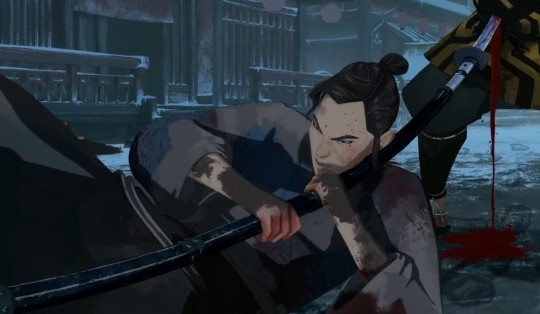
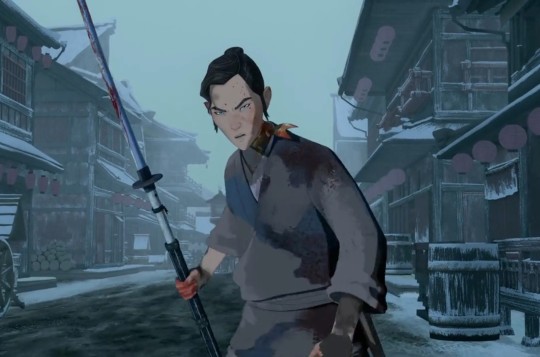

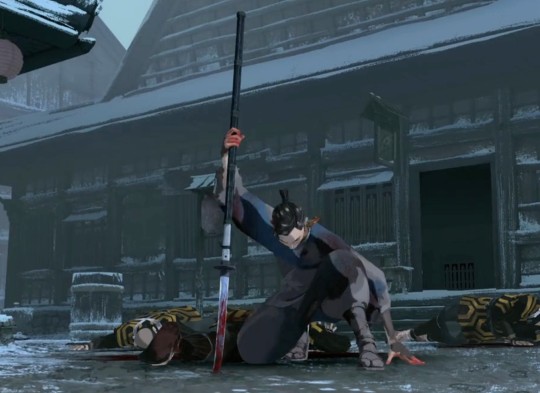
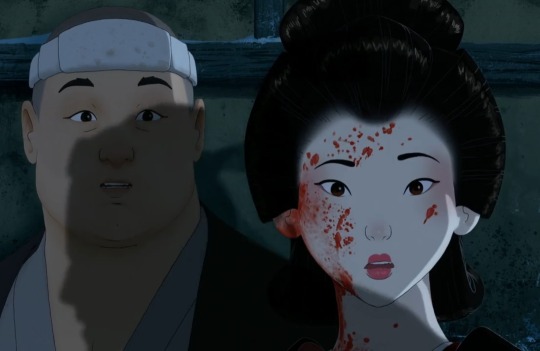
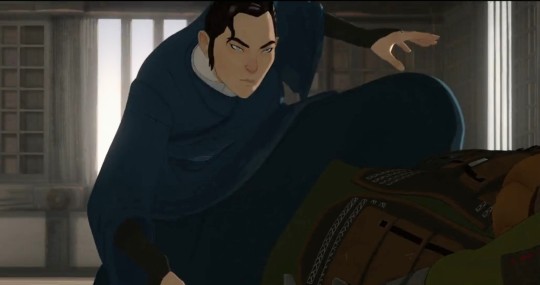
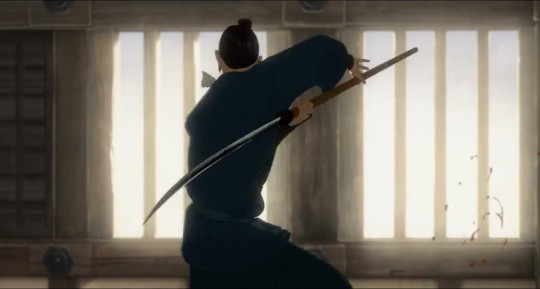
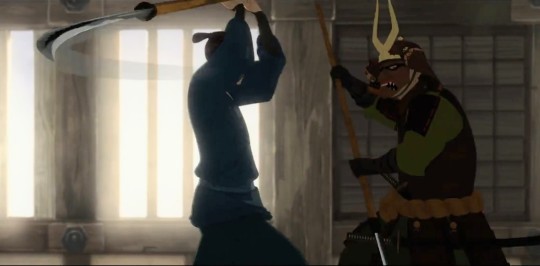
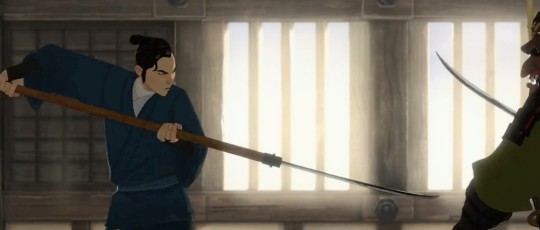
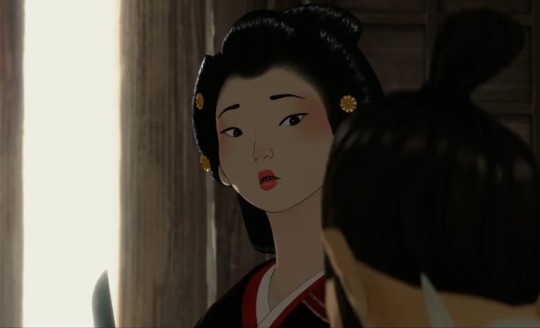
499 notes
·
View notes
Text
So there's a theory circulating around that Mizu's parentage is the opposite of what we've come to assume, which I'm sure many have already heard about.
When it was revealed that the "mother" who cares for Mizu was not her biological mother, but a maid who was paid off to hide Mizu away from those who'd kill her. So her mother might still be out there, somewhere. But what if her European heritage was maternal? That instead of being ashamed of having fathered a mixed bastard, one of the white men's wives/lovers decided to have an affair with a man in Japan, resulting in Mizu's birth and the threats to her life.
This could add so much more drama into the mix.
Because then the possibility is that both her parents might still be alive. Her mother returned to Europe, leaving behind money to Mizu's caretaker to ensure her safety. Her father might be in hiding, trying to distance himself away from Mizu and the White Men as to not endanger them all. He might even be plotting his own brand of vengeance.
Some have proposed that Mizu is the daughter of the late Shogun, who died in the flames. That he hid Mizu away due to the shame of his own hypocrisy; the law that bans Europeans from your shores would easily be undermined due to dealing with them in business, as well as having an affair with one of the men's own lovers. I'm a little shaky on this, but it'd be another neat way to complete the tritagonist status of Mizu, Akemi and Taigen.
Akemi is born privileged and now must climb up the hierarchy of the shogunate. Hers is a story of power, politicking, and the poison of court.
Taigen is born from nothing but rises high above his station, only to lose it all and try again. A tale of honor and self-actualisation.
And Mizu is a child born with immense wealth, but cast aside due to her heritage and appearance. Stripped of everything, now she only seeks satisfaction.
A simple, bloody road to vengeance.
Her father could just be a Ronin. A samurai in court. A farmer. Etc.
Whatever the case, it'd be a really sick twist if done correctly. That in the end, the vengeance she believes she's been chasing all this time has been all for nothing. Like painting but with missing colors, preventing her from fully grasping the true artistry of her goal.
Or this could just be a crackpot theory. Idk.
615 notes
·
View notes
Text
Speculation on Mizu’s heritage
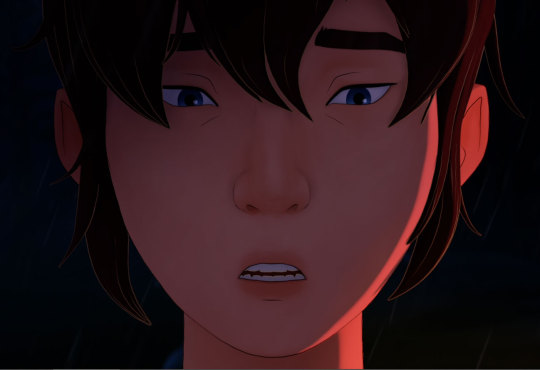
Blue Eye Samurai on Netflix is one of the best things I’ve seen all year. As I’ve been rewatching it, I couldn’t help but speculate on Mizu’s heritage, and I wanted to share my theory so we can all laugh at how wrong I was in a few years. (I am notoriously bad at guessing plot twists. I was totally wrong about how Wandavision and Loki season 1 would end.)
Spoilers and speculation behind the jump.
Short version: Mizu’s mother was a white woman and her father was the Shogun. The Shogun’s wife, Lady Itoh, put the bounty on Mizu’s life because she was proof that the Shogun broke his own laws.
Who Would Want to Kill a Baby?
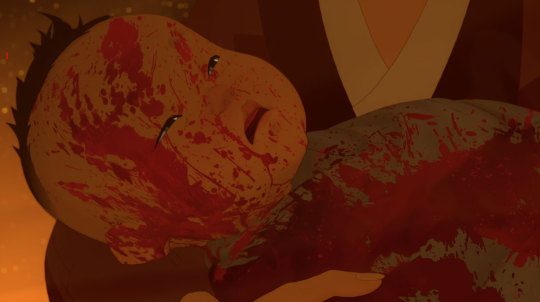
We know that there has been a bounty on Mizu’s head since she was a baby. There are only three reasons I can think of for putting a hit out on a child who’s just been born and couldn’t have personally wronged anyone yet:
1) To deny them an inheritance.
2) To eliminate proof of an affair.
3) To eliminate proof of a crime.
The woman that claims to be Mizu’s mother is Japanese, so Mizu assumes her father must be white. But once Fowler reveals that Mizu’s “mother” was actually her maid, it opens up the possibility that Mizu’s mother was white and her father was Japanese.
We know that someone is willing to a pay a lot of money to kill Mizu, but the maid also ran off with enough money to take care of Mizu for several years, so at least one person in this mess is wealthy. We also know that someone still wants Mizu dead when she's an adult because men come to kill her when her husband rats her out, so she’s still a threat to someone else’s interests at that time.
If the Shogun slept with a white woman and fathered a mix-raced child as a result, that would fulfill all three reasons to put a bounty on a baby. Killing her would remove any chance that a bastard might try to blackmail her way into an inheritance, it would remove proof that the Shogun had an affair, and most importantly, it would destroy evidence that he violated his own laws against Western influence by sleeping with a white woman.
But the True Culprit is…
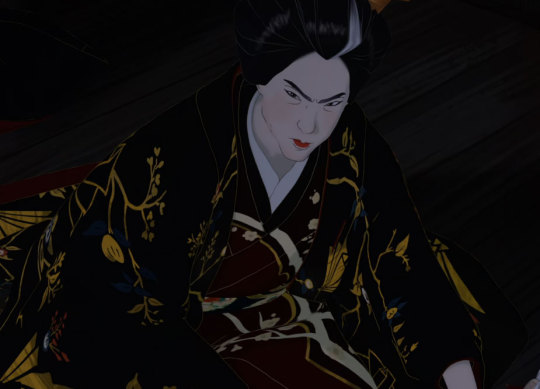
But I don’t think the Shogun put the bounty on Mizu’s life. I think it was the Shogun’s wife, Lady Itoh, for several reasons:
1) Lady Itoh is willing to kill people who learn that her husband broke his own laws.
When the nobles are trying to escape the fire in the finale, Lady Itoh makes her sons lock the door behind them and sentence the other Lords to death because they witnessed the Shogun’s shame, the revelation that he broke his own laws by dealing with Fowler, a white man. She’s demonstrated that she’s willing to kill people to destroy proof of her husband’s violations, so she’d do the same to a mixed-race baby he fathered. It would also explain why Mizu’s maid never claimed the bounty herself; she would have been targeted for death too because she knew about the Shogun’s crime. She probably took whatever money was in the house when the killers came for Mizu, and went on the run as much to save her own life as Mizu's.
2) The woman’s a sadist.
Lady Itoh does everything she can to make Akemi’s life hell once she marries into the family. She saddles her with bitchy attendants and serves her disgusting food at the banquet, and finishes it off with the cooked remains of the bird Akemi tried to free. Then she sends her two more birds the next day, claiming they’re breakfast and lunch. I have no trouble believing this woman would put a hit on a baby!

3) She’s a hardliner against Western influence
After the fire, Lady Itoh orders her sons to destroy 2000 guns which they could have used in the future against their enemies because she’d so fiercely against Western influence. I wouldn’t be surprised if she was the one who came up with the law banning white people and talked her husband into enacting it. That would explain why the Shogun was willing to violate the law, because he didn’t completely believe in it and only enacted it to get his wife off his back.
It Fits a Common Theme of Revenge Stories
Another reason I think Lady Itoh is the ultimate villain is because it fits the common theme that revenge is futile. Revenge usually destroys the person seeking it just as much as anyone they go after. There is a famous quote from Confucius that says, "Before you embark on a journey of revenge, dig two graves." The implication is that the second one is for yourself.
If it turns out that Mizu has been going after the only four men in the country who couldn’t be her father, it would demonstrate how misguided revenge quests are. She’s spent her whole life pouring hatred into the wrong mission.
It would also be a painful twist to know that Mizu was in the same room with Lady Itoh in the finale, but she was focused on killing Fowler instead of realizing that her true enemy was fleeing out the back door with everyone else.

How It Will All Sort Out
I predict that Mizu will eventually learn the truth about her parentage and ultimately target Lady Itoh for death, not just for revenge, but so she can permanently remove the bounty on her head and live her life freely as a woman.
Akemi might end up assisting Mizu since Lady Itoh is also her enemy. Akemi will probably spend season two battling Lady Itoh for control of the household, and thus the country. If Akemi can put her husband in place as the Shogun, she could remove the bounty on Mizu's head.
If Taigan ends up working as a castle guard, this might put him in conflict with Mizu and Akemi if they target Lady Itoh since he would be honor bound to protect her.
It will be interesting to see how it all sorts out!
ETA: I misspelled Lady Itoh's name, sorry! (According to the subtitles it's Itoh, not Ito) I think I fixed every instance.
611 notes
·
View notes
Text

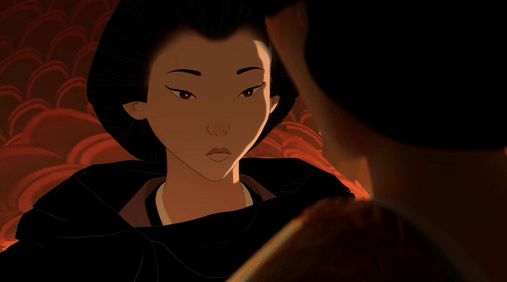
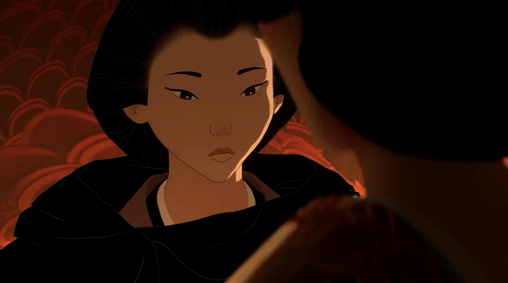
Blue Eye Samurai | Episode 4, "Peculiarities"
1K notes
·
View notes
Text


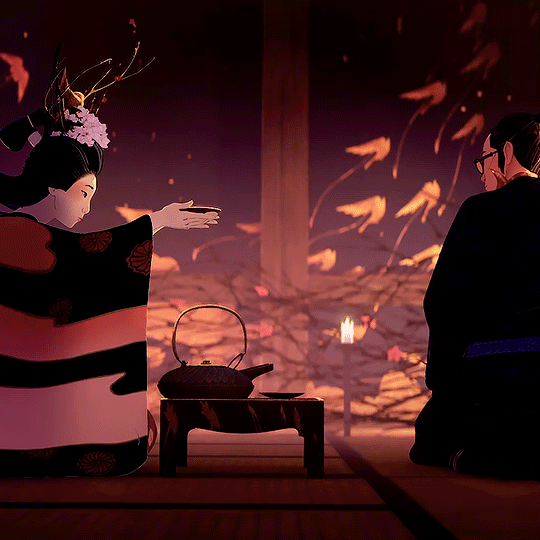

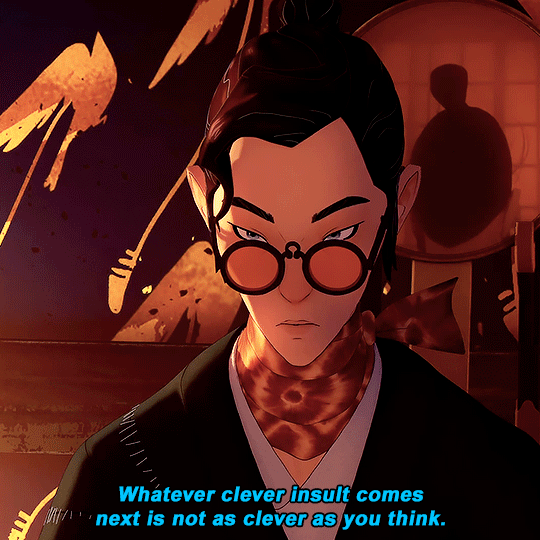




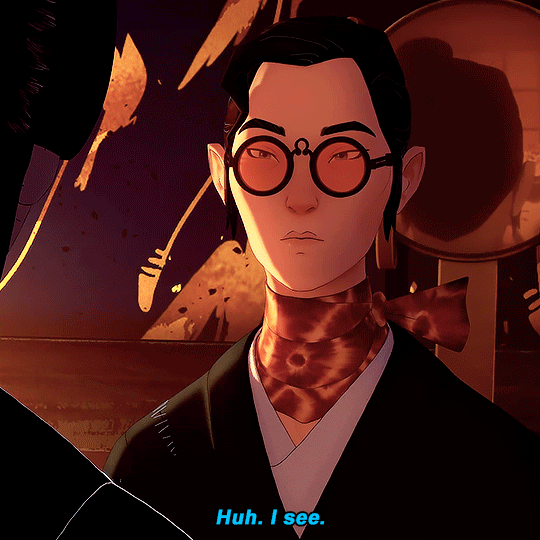
BLUE EYE SAMURAI: 1x04 - "Peculiarities"
↳ "Your Madame explained how it's some essential part of the soul that draws men to brоthеls when it's only naked flattery. Do men usually fall for this?" "The ones I've known? Yes."
3K notes
·
View notes
Text
"the second day of autumn," huh?
In episode 3, Mizu agrees to duel Taigen on the "second day of autumn" when it is currently winter in the story
So can we talk about how
the day Mizu met her husband was probably in the springtime
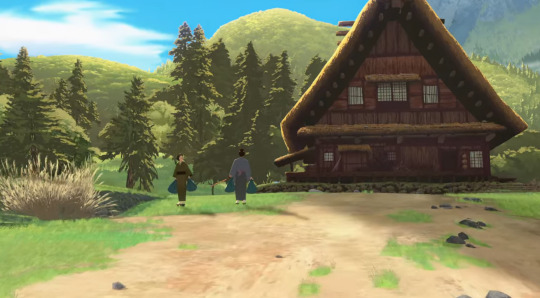
the day Mizu finally slept with her husband was during autumn
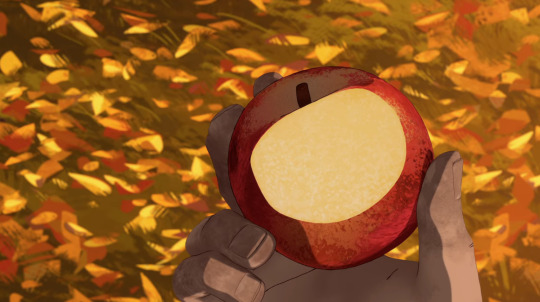
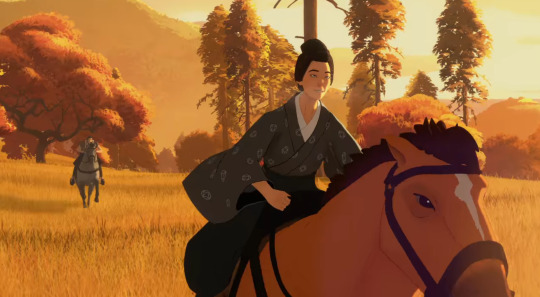
and so was the day they "dueled"
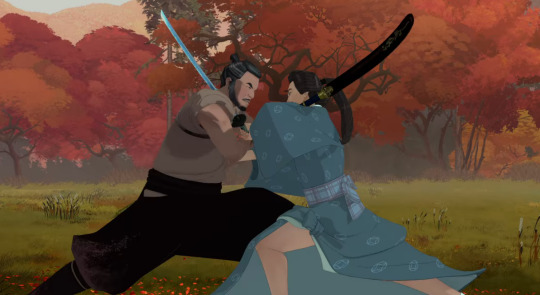
where it becomes clear that fighting isn't just what Mizu is good at - she associates fighting with pleasure. she LOVES it

at least, when she's fighting the right person
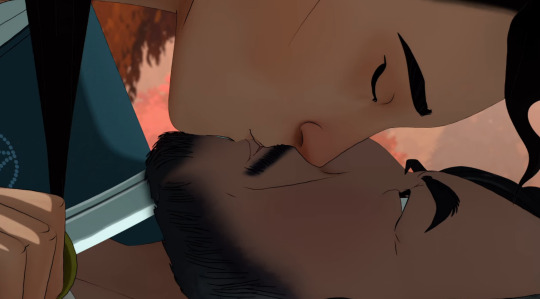
In the brothel, when current-day Mizu sees the threesome in the throes of pleasure, while Madame Kaji is opining on being honest about desires -
Mizu instantly thinks of THIS
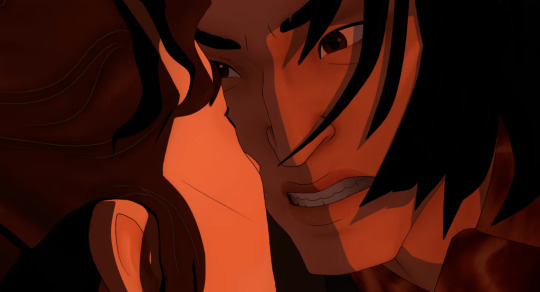
THAT FRAMING SURE LOOKS FAMILIAR
now HEAR ME OUT
a lot of the Mizu+Taigen adventures happen in the snow/winter, but you know what happens in the spring?
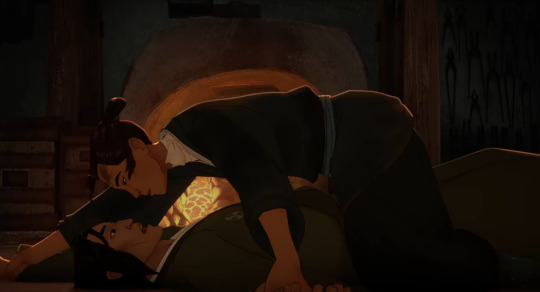
YEAH

YEAH
spring is when their characters AND their relationship both turn a corner
so Mizu's life turns a corner and she meets her husband in the spring, duels him and sleeps with him in the fall - and is betrayed
Mizu's life turns a corner and she reconciles with Taigen in the spring.......... and has agreed to duel him in the fall
it would've taken a few months to sail from Japan to Europe. March plus 6 months is September. Taigen is absolutely gonna end up in London because he fucking wants that fucking duel
do you see what i'm. do you see what i am saying
do you understand that the cherry blossoms blooming in Edo bloom in late March
during the spring equinox
and the "second day of autumn" is the autumn equinox
DO YOU SEE
824 notes
·
View notes
Text
Mizu was wrong to let Akemi be taken because they both deserve better
First, a confession. When I saw this for the first time:
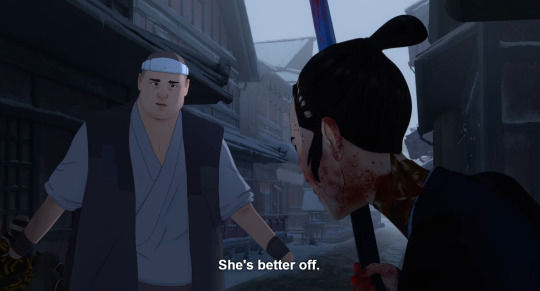
I was relieved. I knew that was what Mizu was going to say and I felt like it's what I would have said in that situation too.
When Akemi does this:
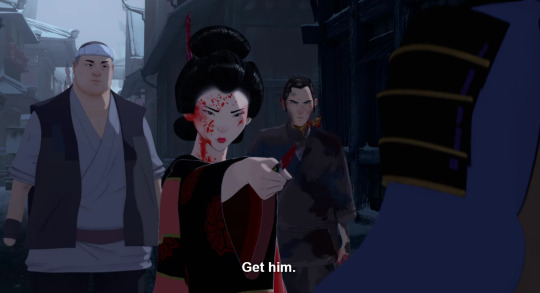
I cringed, because if we know anything about Mizu, it's that she (1) isn't quick to make friends (though to be fair, even though Akemi did try to kill Mizu, so did Taigen - multiple times! - and look how that turned out lol), and (2) doesn't take orders.
So when Akemi and Ringo and later Taigen get angry at Mizu, are they being unfair?
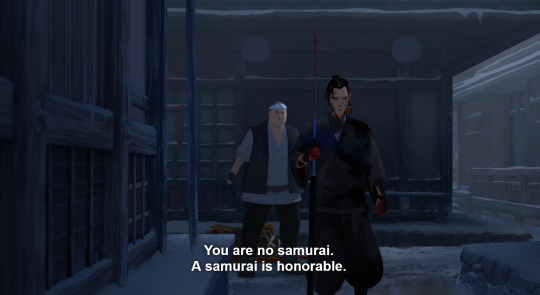
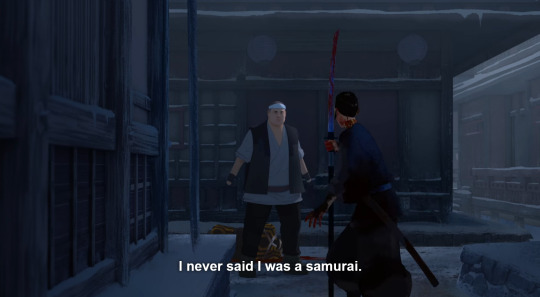

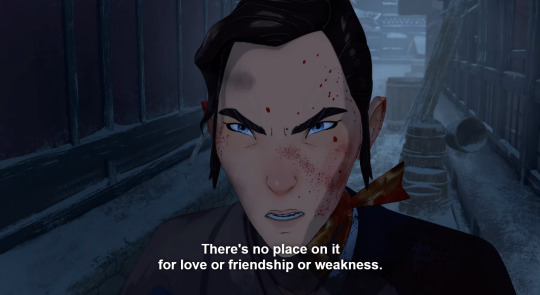
Sure, Mizu isn't obligated to treat Akemi - or Taigen or Ringo or anybody else - nicely, or to serve them, or to be honorable, or be a hero to them, or whatever. No human being is obligated to any other human being. We all have the choice to do whatever we want to anybody else. But the point of flawed characters in storytelling is the tension between those characters and their potential. Their growth into someone who can choose the higher, harder path, who chooses to be obligated to others, who chooses kindness and compassion.
Because Mizu's problem isn't revenge. Nobody is preaching at Mizu that revenge isn't the answer. Her circumstances do suck, her life has been incredibly unfair, she is marginalized, and as far as we and Mizu know for most of the season, she is a child born of violence and no one is saying that that violence doesn't deserve to be repaid in kind.
Mizu's problem is isolation. And the fact that she thinks she has no responsibility toward her fellow human beings, because her hatred of her own circumstances and her having no life outside of her quest devours everything else. This is a problem because it turns Mizu into the worst version of herself. A version that hurts the people who like Mizu, the people who care about her.
Practically, Mizu has just taken on an entire army almost by herself. She's hurt. She's exhausted. If she were to defend Akemi now, it'd be yet ANOTHER fight, this time against horsed and armored samurai.
But that's not the reason Mizu gives Ringo. Mizu's ability or willingness to fight isn't even on her mind. All she says is, "She's better off."
"She's better off" is Mizu deciding what's best for Akemi. Akemi's entire story is about her being a caged bird longing to fly free.

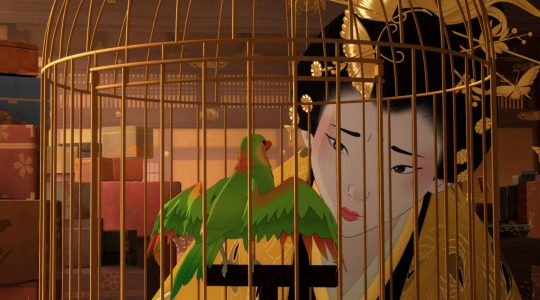
One after the other, every man and woman in Akemi's life makes her decisions for her. She has to grovel and smile prettily and lie through her teeth just for the chance to be heard. Mizu judges Akemi for being a rich princess who isn't being more grateful for what she has, all without understanding Akemi's situation, and without any curiosity for why Akemi feels the way she does. From Akemi's perspective, Mizu is just one more person (one more man!) in a long lineup who ignores Akemi's wishes and (casually!) makes a decision for her that impacts Akemi's life greatly.
In the end, even Seki concludes that Akemi should get to decide what's best for Akemi. What others think that Akemi SHOULD want does not matter compared to what Akemi wants for her own life. As Madame Kaji said - Madame Kaji, who despite calling out the weirdness of Akemi's situation as well as the childishness of her decision to run away - is the only person Akemi meets who doesn't try to make decisions for Akemi, but instead only challenges Akemi to work for and be worthy of what she wants - she needs to decide what she wants for her own fucking self, and then take it.
Mizu being born female does not make her automatically wiser for letting Akemi be taken, and it does not preclude her from having a hand in giving Akemi back to her jailers. A patriarchy that Mizu knows full well would stop Mizu from achieving her own goals if she didn't present as male.
Mizu is still understandable here. She just had to kill Kinuyo, a disabled girl sold by her father into prostitution, a girl in a situation so far beyond Akemi's worst imaginings that I can practically feel Mizu's world being rocked just by comparing them in her mind the way she most likely is. That still doesn't make it right for Mizu to let Akemi be carried off to be sold into marriage by her father against her wishes. Those "good options" Mizu thinks Akemi has don't exist, no more than they ever existed for Mizu. Akemi and Mizu both have to get creative, make the best of their circumstances, take dangerous risks, and break rules in order to have any control over their own lives.
Even on my first watch, when at first I thought that Mizu had made the right decision and that Akemi was being unreasonable, Akemi screaming Mizu's name while being dragged, LITERALLY DRAGGED, back to her father was haunting as hell.
Mizu had the power to help Akemi, and simply chose not to.
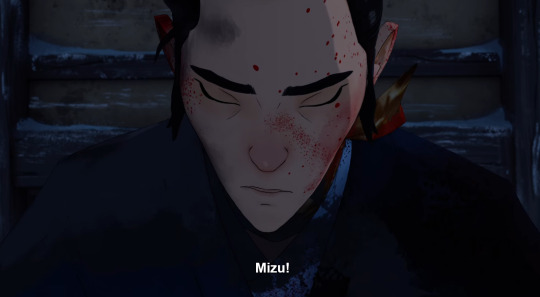
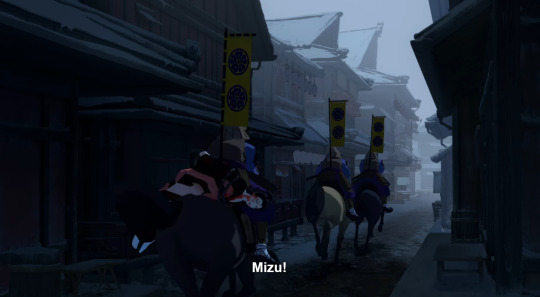
Mizu lets Akemi be taken, Akemi who has just begun to trust Mizu. Mizu calls Ringo weak and quickly - seemingly easily - turns her back on him. Mizu values her quest over Taigen's life, after Taigen has endured days of torture to protect her, and she not only risks his life in the process, but doesn't tell him that Akemi is engaged to someone else, or that she came looking for Taigen, or that she is in danger.
Mizu's sword breaks because it is too brittle. Too pure. Too singleminded. Mizu only melts down the meteorite metal when she mixes the metal with objects from parts of her life that have nothing to do with her quest. Objects from the people she cares about, and who care about her.
All I'm saying is - Mizu doesn't have to be a hero. But she is the better version of herself when she reaches out to help and connect with others. When she's just a decent, kinder human being. And I think that's what this story is telling us that we should want for Mizu.
#akemi isnt involved in this but i do also like this theme of isolation being made clear#when mizu approached ringo and said there are some things i cant do alone#blue eye samurai#analysis#bes spoilers#blue eye samurai spoilers
715 notes
·
View notes
Text
One of many things I like about Blue Eye Samurai is how it portrays its disabled characters. There's a lot to talk about with each of them but for this post, I want to talk about, not the step dad, but the dad who stepped up, Sword Father!
*Spoilers below
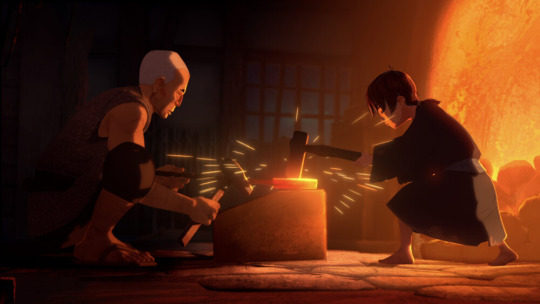
Him and Mizu's relationship is one of my favorite dynamics in the show and seeing how that developed over the years was one of my favorite things about the pilot. It felt very symbiotic and good for the both of them emotionally to have that company and support, especially on Mizu's end.
I really liked seeing how the two worked together and how Mizu accommodated to his needs. I also liked the respect given to Sword Father's ability to take care of himself as an adult even without Mizu's assistance. He's been blacksmithing for years and he's respected in his line of work. Losing his sight did not and does not change that.
I personally think the show does a good job at balancing the reality of him being blind and the accommodations he needs while also respecting him as an autonomous individual and talking about his blindness in a way that feels natural and respectful when it's relevant.
But my favorite thing about this dynamic and Sword Father as an individual is probably the use of audio design in the show in relationship to them. As we see the two of them become a family, and develop this language with each other/way of interacting, sound becomes a key element and that carries over into the entire show.
Being blind, Sword Father relies a lot on his hearing. But we as the audience don't just see this aspect of his character. We're actually made to hear from his perspective and apply that sense to how we perceive the entire season even when he's not present.
The most obvious example is the sound of metal which is used to indicate things like:
Mizu revealing to Sword Father that she forged her sword from the meteorite they found before the camera pans up to the space it used to occupy
The symbolism around Mizu and mixed metal in general
Sword Father realizing that Mizu's at his front door when Ringo brings her and Taigen there which revealed to us, the audience, where Ringo brought them before we see Sword Father come on screen (I loved that moment so much)
and emphasizing the moment of shock the characters in the show had when they heard the sound of gunshots for the first time in the finale in contrast to the clang of swords that we as the audience have gotten so used to hearing.
But the reliance on hearing doesn't just apply to that. In the second episode Mizu encounters Chiaki, a man from her past who she defeats in the present. And you know the biggest tip off the show gives us to recognize him before he reveals himself? His laugh. A noise we would've recalled from the flashbacks he was featured in.
LIKE I JUST THINK THAT'S SO FRIGGIN COOL XD
There's a lot more that can be said about Sword Father and how the show portrays him and his blindness. I personally can't speak on this as a blind person so I'd love to hear what people who are think about it. These are just my 2 cents that I felt like sharing.
685 notes
·
View notes
Text
The parallel of Mizu and Taigen peeping through holes in screens and seeing one another
In 1x01 Taigen looks through a hole in a screen to see Mizu fighting his dojo.
This shot is later paralleled in 1x05 when Madame Kaji opens a hole in a screen telling Mizu it is "A window. A mirror" to desire and Mizu thinks of Taigen while looking through it.
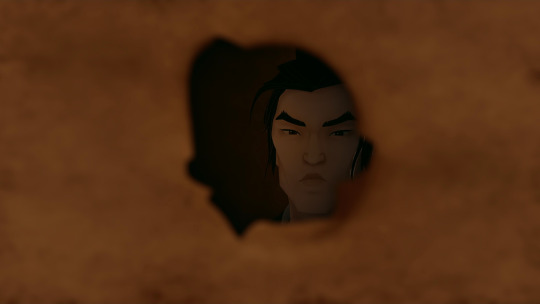
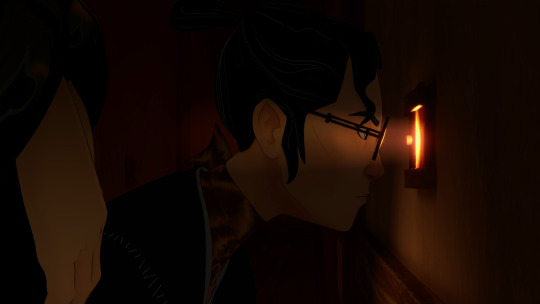
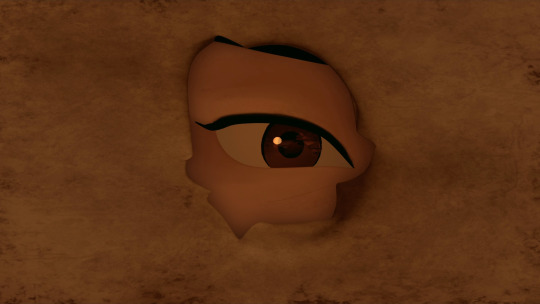
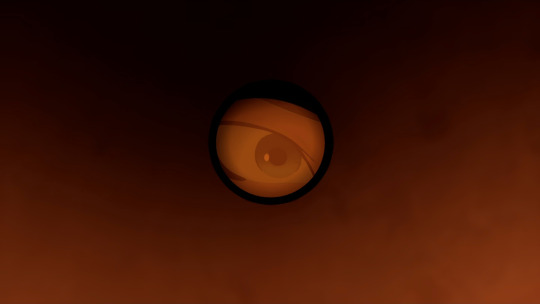
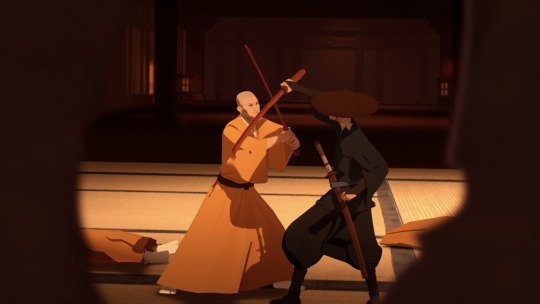

#mizu thinking of taigen and their tussle together while watching a threesome will never not be funny to me. sorry#blue eye samurai#bes spoilers#blue eye samurai spoilers
342 notes
·
View notes
Text
Mizu's spectacles, and the levels of her disguise
In drafting some more Blue Eye Samurai meta posts, I find myself writing out the comparisons between what Mizu can and cannot hide about herself, and how that affects how she moves through the world.
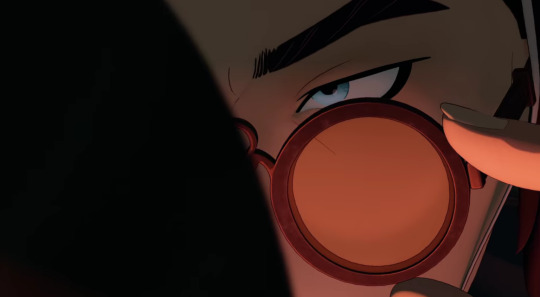
Like, I get the jokes about Mizu's glasses, if only color contacts had existed back then, etc. etc., and I think (hope) that most viewers don't take the glasses jokes seriously, as in "I don't care about the suspension of disbelief because BES is a cartoon." But I wanted to write these thoughts out anyway without burying them in a text post about something else.
I think the points I'm going to lay out here are viewed very differently by different people, so please feel free to add to this post, reply, or put your thoughts in the tags!
Not only do Mizu's glasses not actually help her that much, there's surely more to Mizu's mixed race appearance than just the color of her eyes.
In my view, this was pointed out in episode 1:
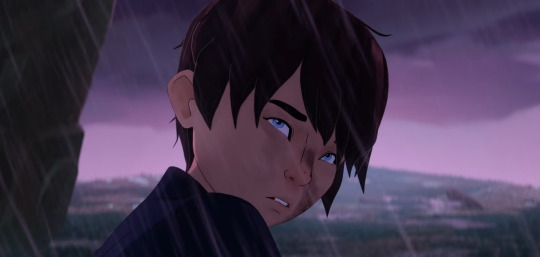
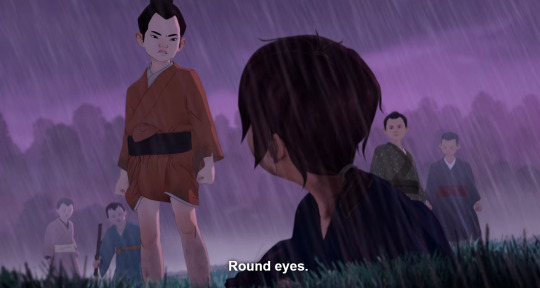
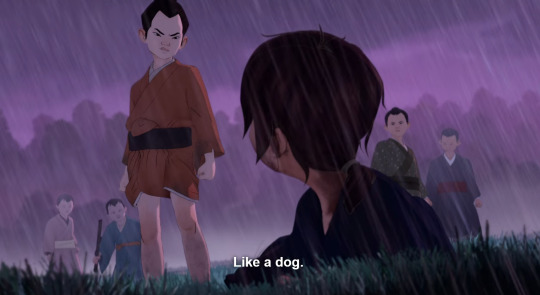
I'm willing to bet most of us were expecting young Taigen to say "blue eyes," not "ROUND eyes."
Obviously this is still about Mizu's eyes, but not even spectacles can hide their shape.
I don't think the show is obligated to point out everything about Mizu's face that isn't quite as Japanese as the people around her expect. Though the creators have said that they specifically designed Mizu - and her clothes - to read both as "white" and as "Japanese," as well as both male and female. I think there's more about Mizu's features that read as "white" than just her eyes.
This is where my own headcanons start entering the picture, but it's my impression that people can just tell that Mizu looks different, whether or not they can put a finger on exactly how.
There's the little girl who looks at Mizu and then hides on the way into Kyoto:

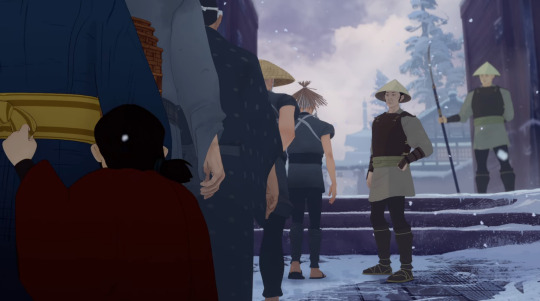

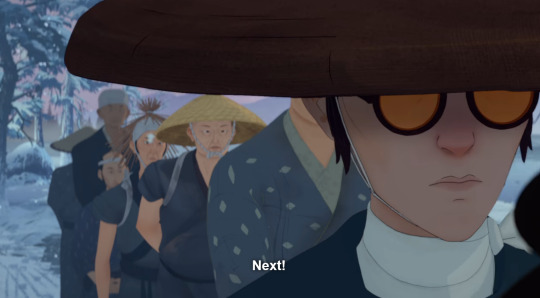
When there's more to your face you'd like to cover up than just your eyes, big hats are a big help!
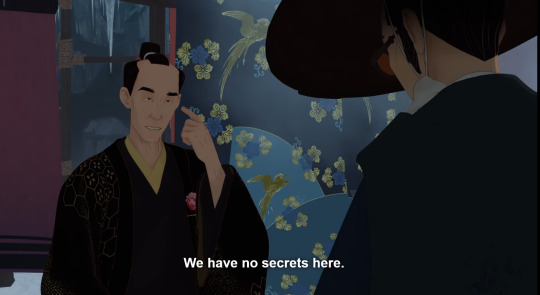
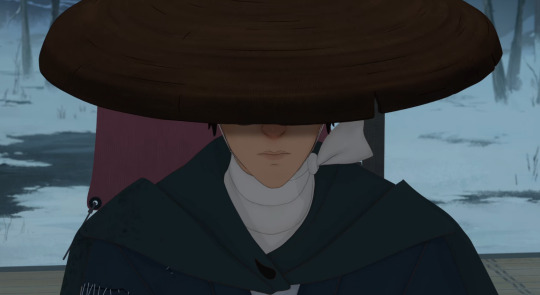
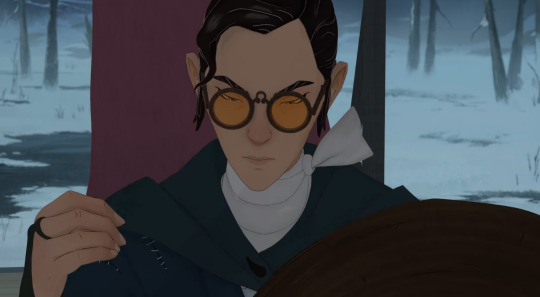
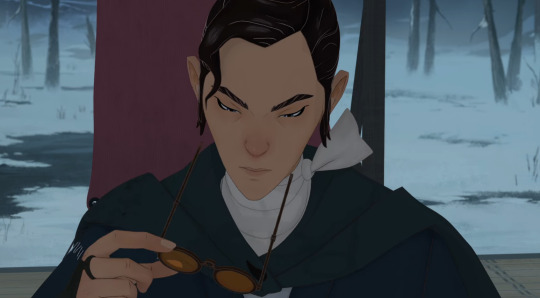
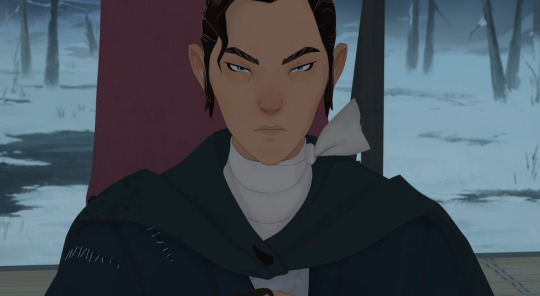
By the way, most of these examples have to come from the first half of the season, since by the second half, either Mizu is too preoccupied with fighting henchmen, or everyone Mizu is facing knows who she is already, and she therefore has no reason to hide her mixed race identity.
It's worth mentioning that the mere fact that Mizu has to hide multiple aspects of her identity - her mixed race and her sex - results in her having to choose clothes that really, really cover her up, which doesn't win her any favors either:
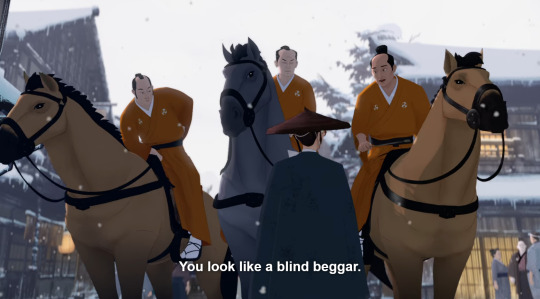
(Zatoichi reference, anyone?)
If it were as easy as, for example, tying her glasses to her head and wa-lah, nobody would ever know she was half-white - then (1) Mizu would've just done that long ago, and (2) Mizu wouldn't be so on guard and on tenterhooks 100% of the time the way she's depicted in the show, even when her glasses are on.
Her spectacles sure don't help her in the brothel, which is full of observant women who are trying to seduce her, meaning they get good long looks at her:
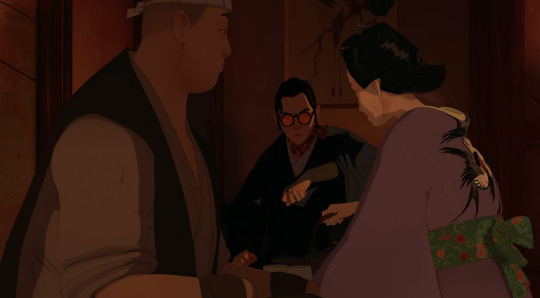

Mizu never takes her glasses off, but they still send a woman to her who has light eyes, thinking that must be what will interest a blue-eyed man:

No wonder Mizu gets mad after this, lol
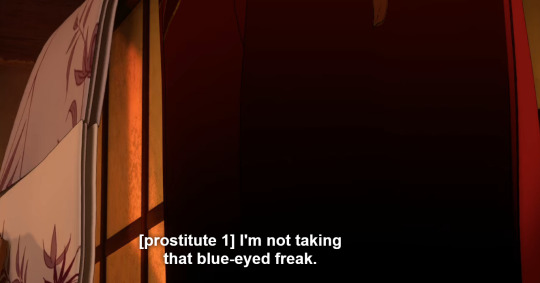
So Mizu never takes her spectacles off in the brothel, it's dimly lit inside, and the women can still tell that she has blue eyes. I'm getting the sense that Mizu putting on her spectacles isn't a guarantee that people suddenly can't tell that she looks different.
And yet no one spots that she's female.
Mizu can hide her breasts, can wear her hair in the right style, can hide what's between her legs, can walk and talk and behave like a man - and she's been doing it for almost her entire life, to the point that not only is she very good at it, but the threat of being found out as female is deadly, but isn't presented in the show as omnipresent.
Let me explain.
She threatens Ringo for nearly saying the word "girl" out loud, because while she's constantly ostracized for being mixed race, being a woman traveling without a chaperone, carrying a sword, and disguised as a man will get her killed or flogged or arrested or some combination of these things.
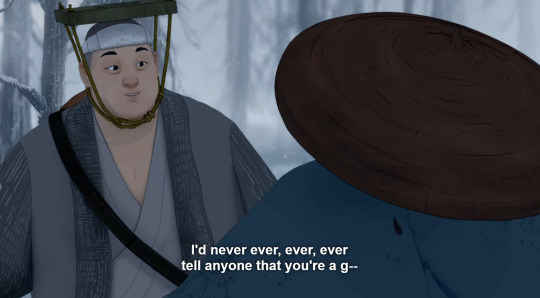

But in addition, it's been drilled into her since she was a child that if she is discovered as female, the combination of her being mixed race and female will identify her as someone extremely specific, someone known to some bad people, and she will be killed:
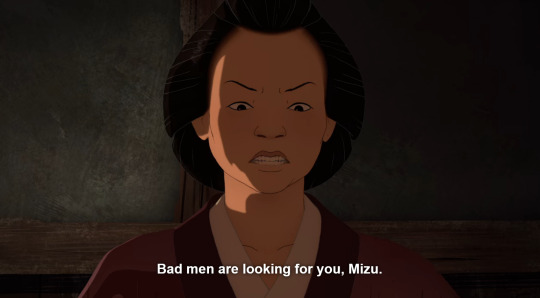
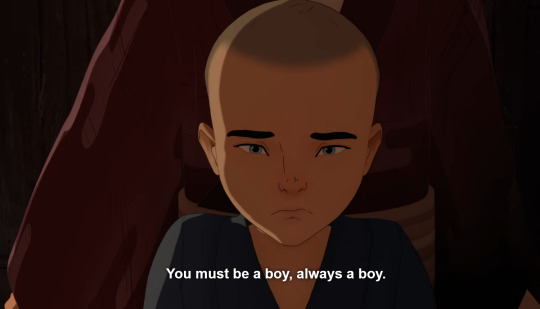
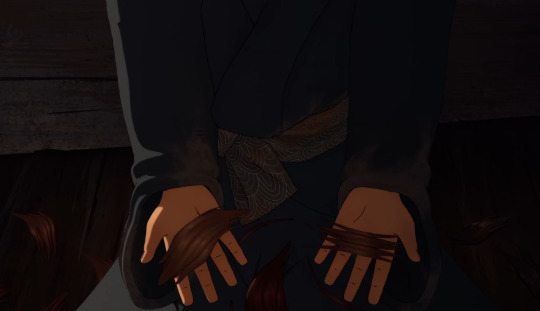
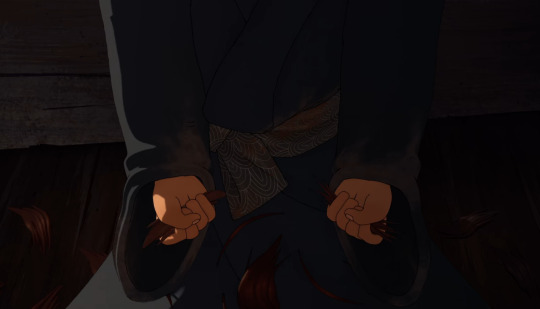
I think of it as Mizu thinking to herself, "Being found out as mixed race means I'm treated badly. Being found out as mixed race and a woman means I'm dead."
Mizu's hair is cut as a child. But she isn't made to wear a big hat, or cover her eyes somehow, or anything like that. Because hiding her sex is a more successful endeavor than hiding her race.
Ringo finds out she's female by accident, but once Mizu accepts the fact that he won't rat her out, she relaxes pretty early on in the season. Because the threat of being found out as female is mitigated pretty much 99.9%, since Mizu has gotten so good at being a man. And also, because most of the time, people see what they want to see. Even if Mizu's face makes her stand out as "not 100% Japanese," no one in the world of BES looks at Mizu's clothes, her bearing, her sword, hears her voice, and will ever in a million years conclude that she is a woman, because expectations around gender roles in the Edo period were so rigid and so widely enforced.
One detail that proved this to me is after the Four Fangs fight:
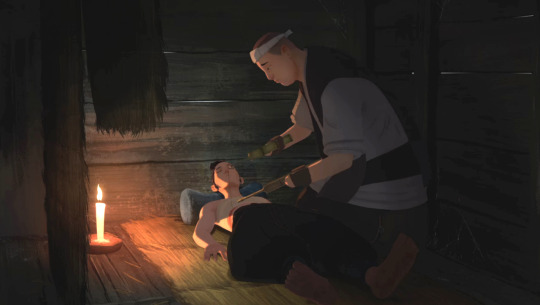
Ringo takes off Mizu's clothes so he can stitch her up, then leaves her clothes off even after he's done. He doesn't even throw her cloak over her as a blanket or anything. There's a little a straw (pallet?) as a divider there on the left, but anyone could just peek around it and see Mizu and her chest bindings. (I think it's mostly there as a windbreaker.)
And Taigen is right there, but he doesn't give a shit:
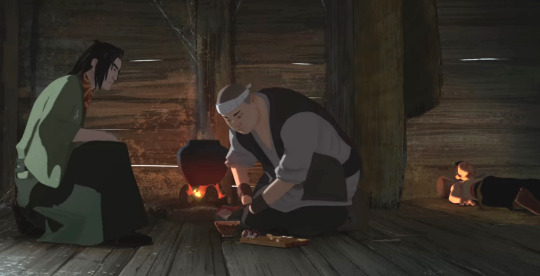
Opinions probably vary hugely on this, but my impression is that because the show doesn't make any kind of deal about Taigen being in the room with Mizu here, my guess is that Mizu isn't in any danger of Taigen thinking she's female. Even when I watched the show for the first time, I assumed that Taigen had seen Mizu out of her clothes here, and that he thought nothing of it.
Eat your heart out, Li Shang (Mulan 1998). I actually do think that this scene is a direct and purposeful side-eye to that movie, lol
There's obviously some nuance to how "severe" being mixed race is compared to how "severe" being a woman is for Mizu:
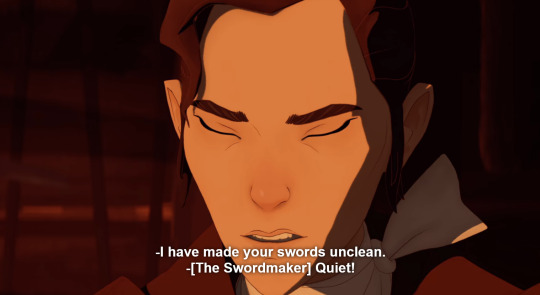
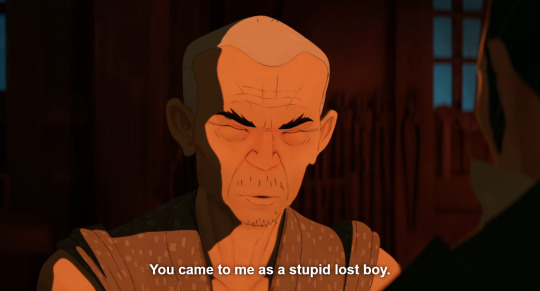
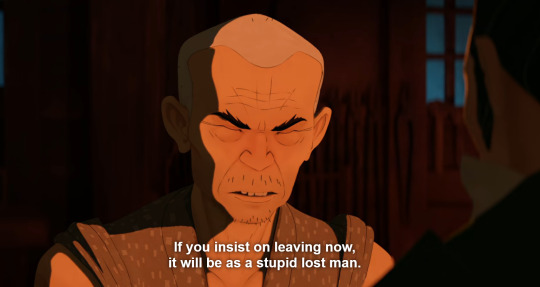
After all, Swordfather can't bear to listen to Mizu confess to being a woman.
So a Japanese man can go wherever he wants, whenever he wants in BES. A Japanese woman has limited options: marriage, religion, or a brothel. A mixed-race man is an eyesore in this story. A mixed-race woman is a death sentence.
May as well eliminate the female aspect, and do what you can about the mixed-race aspect. Because that's just realistic.
Meaning Mizu can avoid the strictures Edo society places on women. But she can't avoid the repercussions that come with being mixed race. And I truly don't think that it's just because "there's no brown contacts yet."
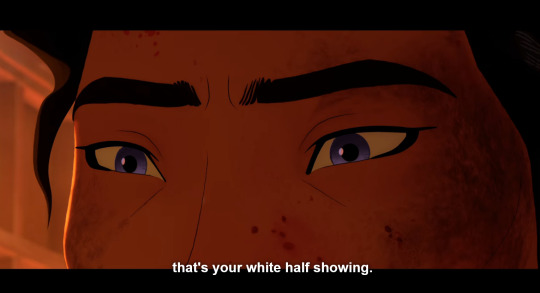
435 notes
·
View notes
Text
What Are Little Girls Made Of?
“That child would see you and run.”
Master Eiji has several amazing lines as the local Wisdom Dispenser of Blue Eye Samurai, but I think this is the deepest of all.
It doesn’t sound like a dissuasion from Mizu’s quest, but it is.
It’s confirmation that she’s a soulless beast, but it’s a warning instead of an insult.
In the Ronin and the Bride play that parallel’s Mizu’s singular attempt at being happy, in the very moment where Mizu decides to throw away her relationship with Mikkio and her patience for Mama, the ronin puppet murders his child. In the immediate context of episode 5, it’s a literal demonstration of Mizu killing her chance at peace and a future.
Now flash forward to episode 7, on the eve of her quest fulfillment. In pointing out her hollowness, Master Eiji is implying that Mizu once had a soul. Once had an option to turn back. Once had gentleness. Once had patience. Once had teachability in her. Once had innocence.
If her rebirth and reforging of that sword mattered afterwards, why did the conversation still shift towards the content of Mizu’s heart and not her head?
Eiji is making a suggestion that should shatter the viewer—even if Mizu seemingly blew past it completely.
Is Mizu becoming a villain?
On paper, the answer is no. Blue Eye Samurai is commendably great at keeping Mizu amoral for her own benefit, but not unkind.
Narratively, still no, but the feeling that Mizu isn’t a good person should linger.
Fowler spelled it out in the final boss, but that doesn’t count in my eyes. He was taunting her in-story, and making a point about whiteness being genetically destructive out-of-universe.
[By the way, I think BES was doing a great job talking about colonialism until episode 8 which was a little too heavy handed with Fowler’s rancid takes right at his actual brawl with Mizu, but that does not enter into this post.]
If it was just Fowler’s cheekily evil means to an end, to get under Mizu’s skin and into London so he would have the cultural upper hand, Mizu being on a dark path would already be stale as it was uttered in the writers’ room.
Mizu doesn’t want to be associated with innocence, but Eiji insisting that maybe she should be, that maybe she is wrong to abandon happiness, needs to be a red flag to the viewer.
Mizu’s no hero. She’s no samurai. But she is her own unreliable narrator. If who she once was would be afraid of her now, then maybe we would do well to judge Mizu’s actions in England by the same lens as Swordfather judges: with the intent to dissuade her from whatever it is she sees.
80 notes
·
View notes
Text

I want to be great 🔥
3K notes
·
View notes
Text
Mizu, femininity, and fallen sparrows
In my last post about Mizu and Akemi, I feel like I came across as overly critical of Mizu given that Mizu is a woman who - in her own words - has to live as a man in order to go down the path of revenge.
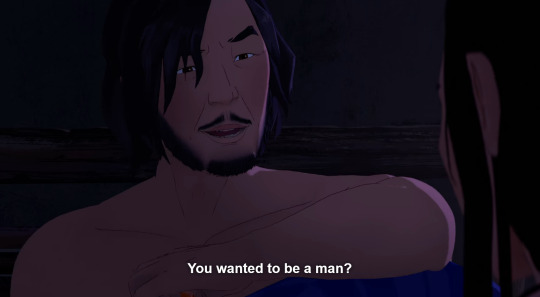
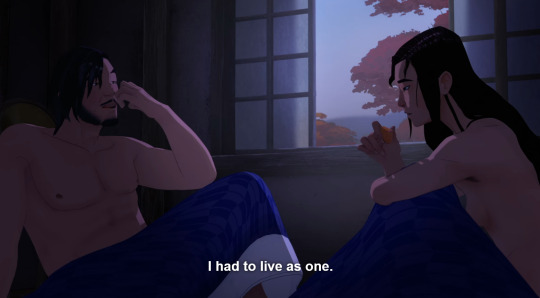
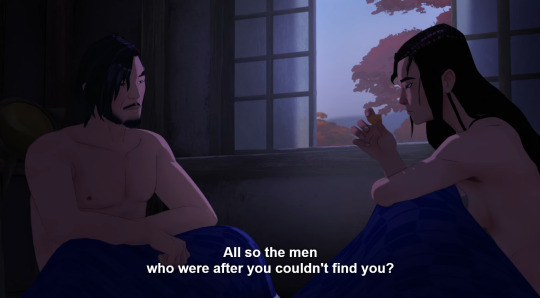
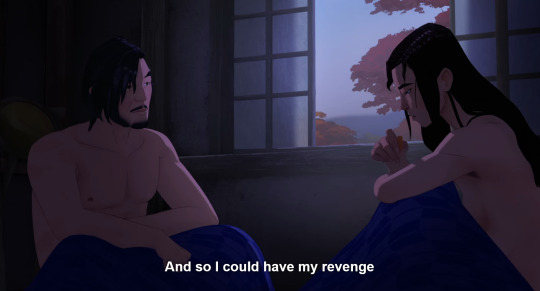
If she is ever discovered to be female by the wrong person, she will not only be unable to complete her quest, but there's a good chance that she'll be arrested or killed.
So it makes complete sense for Mizu to distance herself as much as possible from any behavior that she feels like would make someone question her sex.
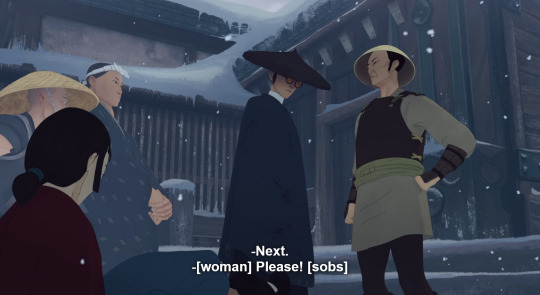
I felt so indignant toward Mizu on my first couple watchthroughs for this moment. Why couldn't Mizu bribe the woman and her child's way into the city too? If Mizu is presenting as a man, couldn't she claim to be the woman's escort?
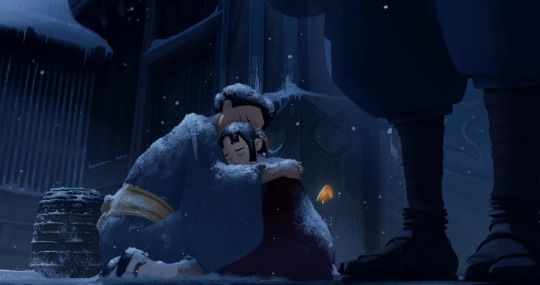
However, this moment makes things pretty clear. Mizu knows all too well the plight of women in her society. She knows it so well that she cannot risk ever finding herself back in their position again. She helps in what little way she can - without drawing attention to herself.
Mizu is not a hero and she is not one to make of herself a martyr - she will not set herself on fire to keep others warm. There's room to argue that Mizu shouldn't prioritize her quest over people's lives, but given the collateral damage Mizu can live with in almost every episode of season 1, Mizu is simply not operating under that kind of morality at this point. ("You don't know what I've done to reach you," Mizu tells Fowler.)
And while I still feel like Mizu has an obvious and established blind spot when it comes to Akemi because of their differences in station, such that Mizu's judgment of Akemi and actions in episode 5 are the result of prejudice rather than the result of Mizu's caution, I also want to establish that Mizu is just as caged as Akemi is, despite her technically having more freedom while living as a man.
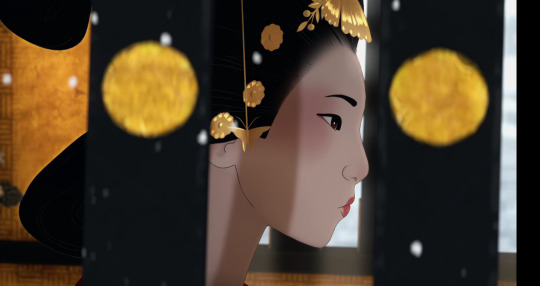
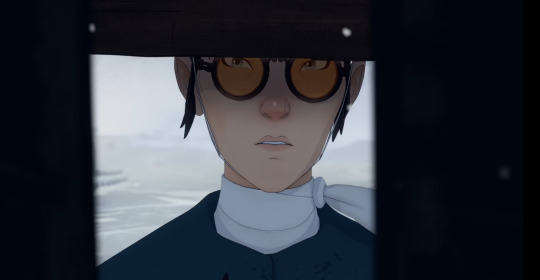
Mizu can hide her mixed race identity some of the time, and she can hide her sex almost all of the time, but being able to operate outside of her society's strict rules for women does not mean she cannot see their plight.
It does not mean she doesn't hurt for them.
Back to Mizu and collateral damage, remember that sparrow?

While Mizu is breaking into Boss Hamata's manse, she gets startled by a bird and kills it on reflex. She then cradles it in her hands - much more tenderly than we've seen Mizu treat almost anything up to this point in the season:
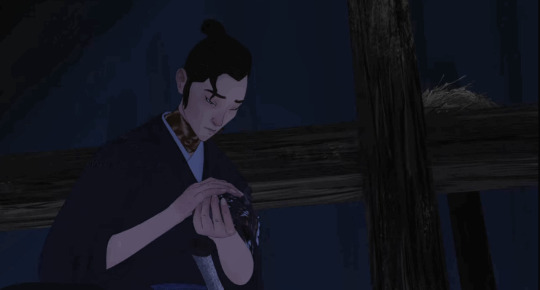
She then puts it in its nest, with its unhatched eggs. Almost like she's trying to make the death look natural. Or like an accident.
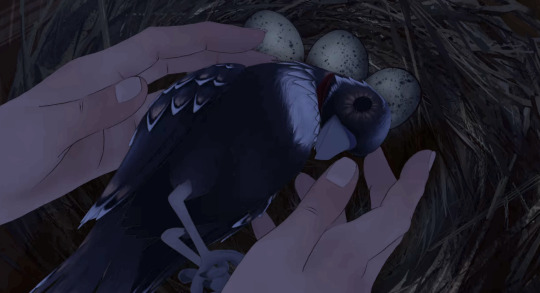
You see where I'm going with this.
When Mizu kills Kinuyo, Mizu lingers in the moment, holding the body tenderly:
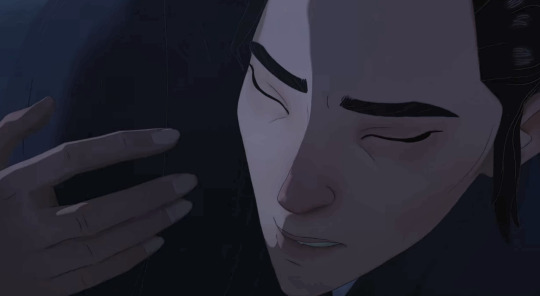
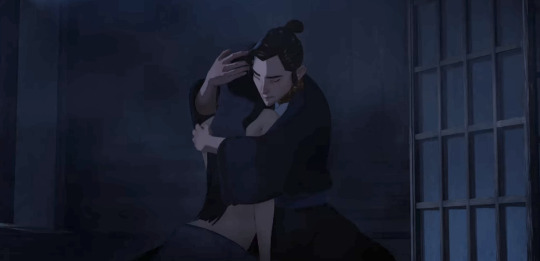
And btw a lot of stuff about this show hit me hard, but this remains the biggest gut punch of them all for me, Mizu holding that poor girl's body close, GOD
When Mizu arranges the "scene of the crime," Kinuyo's body is delicate, birdlike. And Mizu is so shaken afterward that she gets sloppy. She's horrified at this kill to the point that she can't bring herself to take another innocent life - the boy who rats her out.
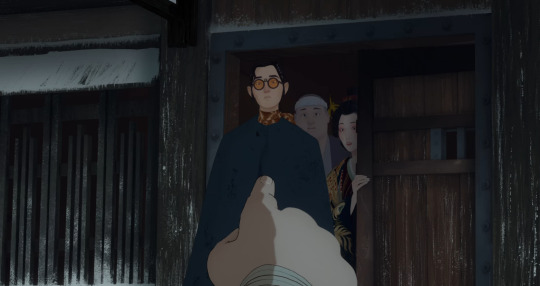
MIZU'S ONE MOMENT OF SOFTNESS AND MERCY, COMING ON THE HEELS OF HER NEEDING TO KILL A GIRL TO SPARE HER THE WORST FATE THAT THIS RIGID SOCIETY HAS TO OFFER WOMEN, AND TO SPARE A BROTHEL FULL OF INNOCENT WOMEN WHO ARE THE CASTOFFS OF SOCIETY, NEARLY RESULTS IN ALL OF THEIR DEATHS
No wonder Mizu is as stoic and cold as she is.
And no wonder Mizu has no patience for Akemi whatsoever right before the terrible reveal and the fight breaks out:
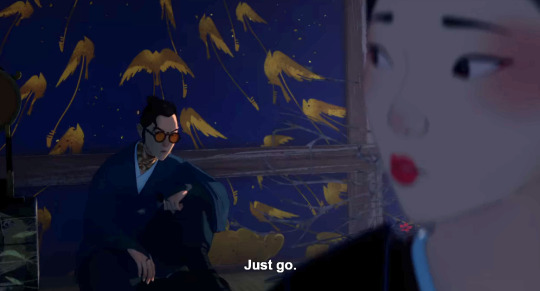
Speaking of Akemi - guess who else is compared to a bird!
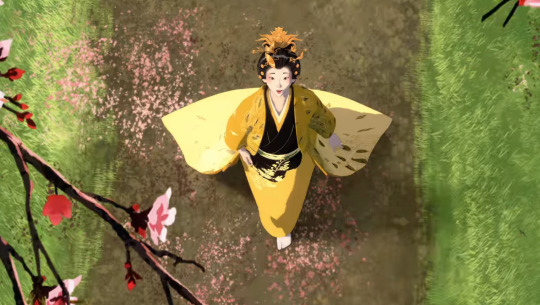
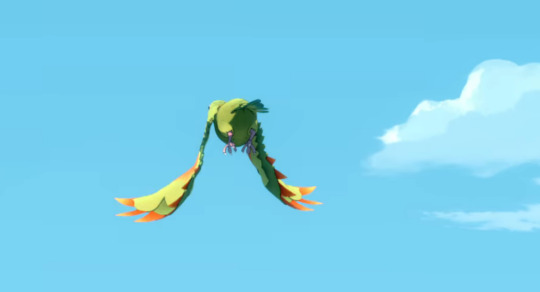
The plumage is more colorful, a bit flashier. But a bird is a bird.
And, uh
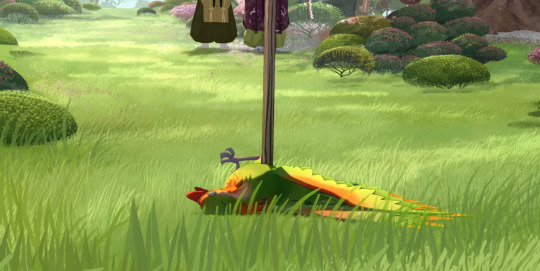
Yeah.
I like to think that Mizu killing the sparrow is not only foreshadowing for what she must do to Kinuyo, but is also a representation of the choice she makes on Akemi's behalf. She decides to cage the bird because she believes the bird is "better off." Better off caged than... dead.
But because Mizu doesn't know Akemi or her situation, she of course doesn't realize that the bird is fated to die if it is caged and sent back home.
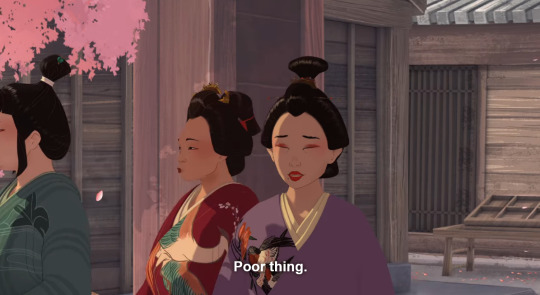
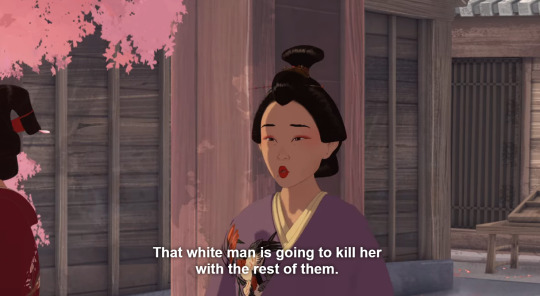
Mizu is clearly not happy, or pleased, or satisfied by allowing Akemi to be dragged back to her father:
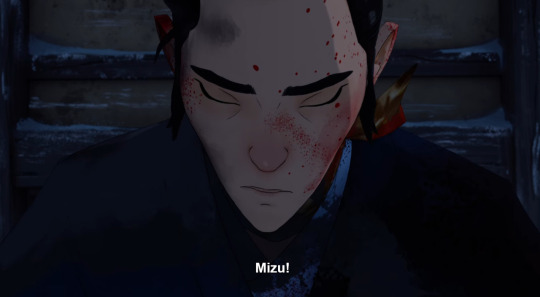
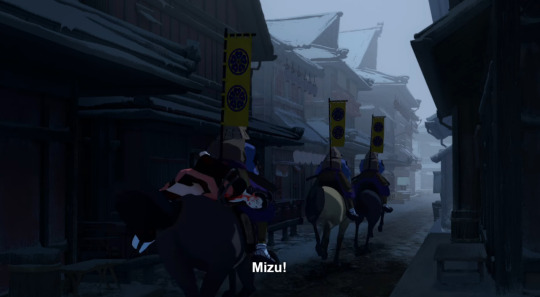
But softness and mercy haven't gotten Mizu anywhere good, recently.
There is so much tragedy layered into Mizu's character, and it includes the things she has to witness and the choices she makes - or believes she has to make - involving women, when she herself can skirt around a lot of what her society throws at women. Although, I do believe that it comes at the cost of a part of Mizu's soul.
After all, I'm gonna be haunted for the rest of this show by Mizu's very first prayer in episode 1:
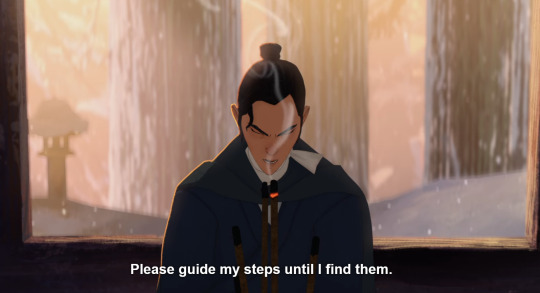
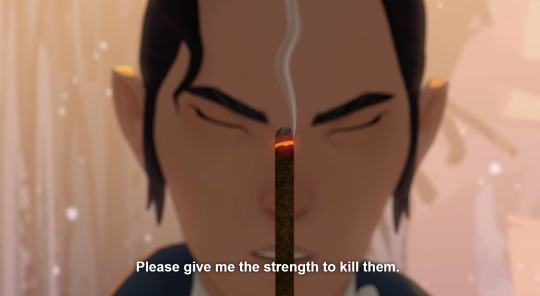
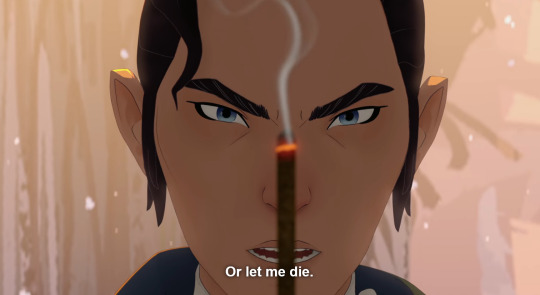
"LET" her die. Because as Ringo points out, she doesn't "know how" to die.
Kind of like another bird in this show:
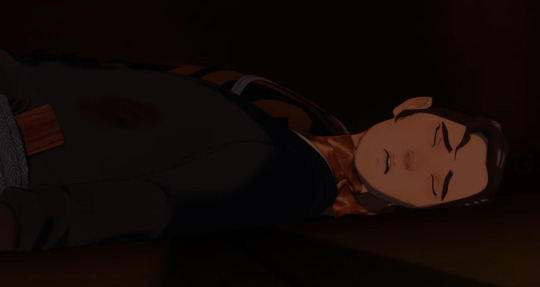
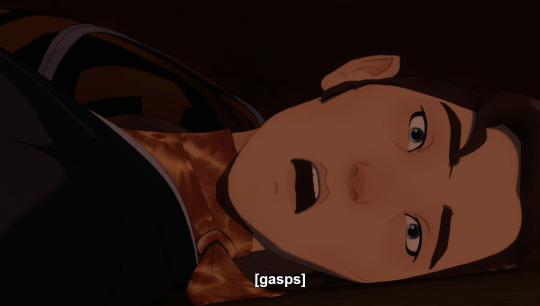
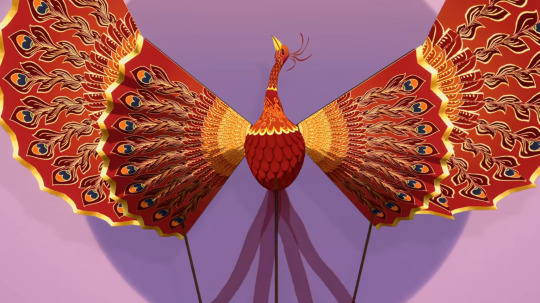
#aough#i would love that post about kinuyo. its so tragic.#blue eye samurai#analysis#blue eye samurai spoilers#bes spoilers
10K notes
·
View notes
Text

I just noticed another Mikio/Taigen parallel.

The end of this relationship is Mizu throwing a knife at Mikio (what he thought he was teaching them), which kills him.
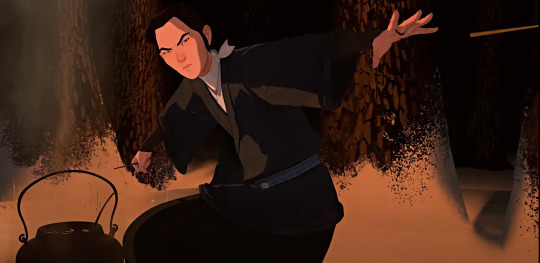
Awaiting the tea party with Heidi Shindo, Mizu and Taigen sort of start to bond. Mizu throws a chopstick back at him, reminiscent of Mikio’s death.
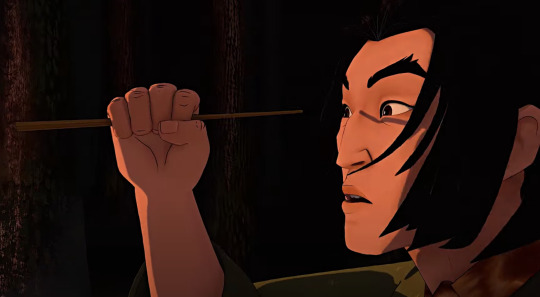
But Taigen catches it.
I feel like this symbolises the two men’s very different reactions to Mizu’s true nature and fighting ability. Mikio is caught off guard by it, Taigen is able to match it. It’s why Mikio leaves Mizu, and it’s why Taigen follows Mizu. It leads Mikio to cast Mizu aside, it leads Taigen to respect Mizu. Mikio calls Mizu a monster for it, Taigen admits Mizu is better than him.
It’s such a small thing, but it feels like Mizu goes “this is me”, and it’s Mikio’s downfall, but Taigen *catches* it.
Could also be nothing, but my brain went brr.
#oh its not nothing its SOMETHING all right#blue eye samurai#blue eye samurai spoilers#bes spoilers#analysis
1K notes
·
View notes
Text
I love how the writers went "well she IS on drugs anyway, so" and gave us this:




641 notes
·
View notes
